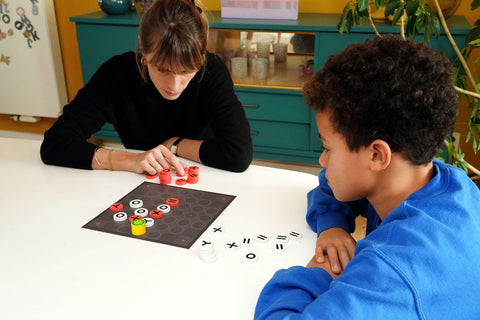Even as a child, I always loved playing (and especially winning, I admit), but like any major dyslexic, I never really got off on going through the rulebooks, I was too lazy to read, then reread because I had necessarily understood something wrong. In short, for me to play a game, it was better to have it explained to me, and for it to be quick, so as not to lose my attention (or that of my brother). As a result, in my family we mainly played classic games, like Checkers, Dominoes, Connect 4, Backgammon, Yahtzee, Pictionary and a lot of cards, for the simple reason that these were pretty much the only games that had reached my parents' generation and that they were able to pass them on to me. Since the apple never falls far from its tree, you will notice that the majority of the games mentioned above are 2-player games and some are abstract. I admit that my gaming education may seem a little thin for a modern geek, but it was rich enough to give me a taste for gaming. And then I reassure you, I still played a little Magic and a lot of video games. Finally, it's lucky for me to have started working in the gaming sphere having missed a few decades of news because seen from another angle, it gives me a lot more to discover. Rather practical, when you spend every other weekend at a gaming festival.
Why a publisher specializing in abstract games?
Coming from the graphic arts, I was not destined to be a game publisher, besides who is really destined to become a game publisher? I wonder. I didn't even know what this job consisted of, it was the force of circumstances that pushed me this far. It all started a few years ago, when I met Claude Leroy on a café terrace in the depths of the Cévennes. I greet him in passing and thank him for introducing me to the wonderful world of game algorithms, "ludemes", as he likes to call them. For those who are still wondering, what is a game publisher? In very very very brief, it's a bit like a book publisher. It's not the one who writes the story, but the one who does everything so that the story can exist. The publisher does not invent the game and its mechanics (even if some can do it), but he contributes to the finalization and realization of an author's project, by the choice of the theme, the graphic charter, the production, the logistics, the communication strategy, the translations, and a thousand and one things that we do not imagine when we come to look for something to have fun on Ludum. It is therefore a very complete job, where juggling with different hats is the basis for achieving the objectives that we have set ourselves. What I like and fascinates me about this work is being able to build objects from an invisible and intangible raw material. If you think about it for two minutes, the physical and mathematical laws that govern the universe exist without human intelligence. We only draw conclusions from these pre-existing concepts to use them for concrete and useful purposes, in a multitude of different fields. To develop an abstract game, you also have to use and draw inspiration from these notions in order to find forces that oppose and complement each other to create an exploitable alchemy. You have to constantly innovate until you find a mix that will provide the same unique and renewable experience for the greatest number of players. At Cosmoludo, a game is necessarily universal, and there is nothing more universal than an abstract game.
What is the basis of a Cosmoludo game?
The ideal cocktail of a Cosmoludo game is a perfect balance between power and simplicity. Accessible and quick to understand, with easy and intuitive movements, which allow you to think several moves in advance without too much difficulty. All this on a timing of 10 to 20 minutes, neither too long nor too short. This is the basis of our games. A particularity at Cosmoludo is to work with a strong editorial line, simple rules, short games, maximum replayability and immense depth of play. This line, if we respect it, infallibly provides universal games, intended as much for inveterate players as for people who are completely ignorant of the gaming world. Our strength is to respond to a formulated or unconscious request, to stimulate one's mind with simple and clever objects. Our idea is to give those who want it a moment of freedom where we play, for about fifteen minutes by concentrating our energy on the essential of what is in front of us. A board, pawns and mechanics. No need for a theme to find your way around, just a refined, real and functional universe that leaves room for the concrete. In each game, it is always more or less the same story that is drawn, but each time with a new scenario that evolves as it goes along. To date, all our games are exclusively 2 players, but we are working on multiplayer games for the near future.
Why do our games look so special?
In my first professional life, I worked a lot on visual abstraction for communication purposes. What we call minimalism. It is the art of stripping down, keeping only the essentials to capture attention as quickly and simply as possible on a message, a work or an object. This concept of minimalism corresponds perfectly with what Cosmoludo offers in terms of games. This is why it seemed natural to me from the start to take charge of the graphic aspect of the games (and the company) myself to apply this layer that I already mastered quite well. It is very gratifying to see that people stop at our stand because they find the games beautiful. And what is really cool is that in reality our games look from the outside as they do on the inside. Modern, simple and timeless at the same time.
Our flagship titles
Among the games that have made us successful, you will find Kamon, by Bruno Cathala. This is the game that we internally call beginner level, because it is the sure value that everyone agrees on. The goal of the game, to win! Not very original you might say, except that you have 3 victory modes, which you will achieve more or less easily by respecting the constraints (of color or symbol) imposed by your opponent. Then, there is Yoxii, by Jérémy Partinico that we call intermediate level. The goal, to have more points than your opponent around the Totem, when he is completely blocked at the end of the game. The more the game progresses, the more the board fills up, thanks to the obligatory movement of the Totem, which serves as a guide to place the other pieces. The game feeling is vaguely reminiscent of chess and go, while being much simpler but no less strategic. Then you have Hokito, by Claude Leroy, also intermediate level. Visually, it looks a bit like Checkers, but in reality, nothing to do with it. The goal is to score more points than your opponent by creating stacks. Except that you don't make the stacks as you want, you must always land on a single piece, if you move a single piece and on a stack, if you move a stack. As a result, the choices become more and more limited as the game progresses. The dynamic is very intense, from the first move! And finally, we have Mana and Pantareï, also by Claude Leroy, who are the 2 experts of the range, which we place rather at the expert level. In Mana, you have to capture the opposing Daïmio to win the game. The originality of the game lies in the movement of the pieces which is done according to the values of the squares (1,2,3) and the return to play of the captured pieces. A very good alternative for beginners to chess. In Pantareï, you must be the first player to reach a stack of 7 floors. A game so minimalist that there is not even a board. You can take it anywhere! Explosive and hyper strategic, think carefully before playing it as a couple. As you will have understood, at Cosmoludo everyone will find what they are looking for. And since good news never comes alone, our latest addition, Oxono by Jérémy Partinico, joined the range at the beginning of 2024. Intermediate level, the goal is to line up 4 pieces of your color or 4 pieces of the same symbol, vertically or horizontally. As surprising as it is addictive. Also discover it on Board Game Arena.
Tom, Cosmoludo





Comments (0)
There are no comments for this article. Be the first to leave a message!